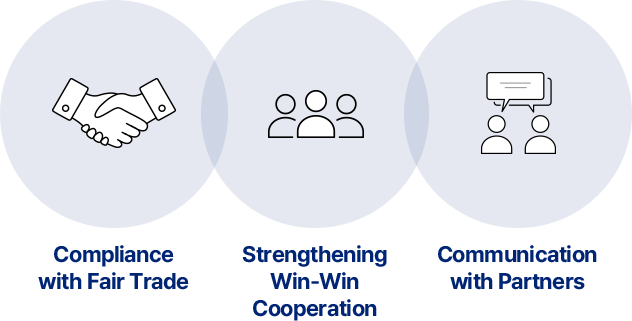Supply Chain
Supply Chain Management System
Supply Chain Management Policy and System
In response to stakeholder demands and changes in domestic and international supply chain regulations, SK Gas implements systematic ESG supply chain management. We have established and enforced a Code of Conduct and guidelines for our Partners, approved by top management, to foster mutual growth. ESG assessments and continuous monitoring are conducted, especially focusing on key suppliers. All Partners are required to comply with the Code of Conduct, which is stipulated in our contracts. Additionally, we have formalized a green purchasing policy to create a socially responsible purchasing environment.
Furthermore, SK Gas operates various financial and non-financial shared growth programs with our Partners, centered on three core values of shared growth.
Supply Chain Management Organization
SK Gas manages its supply chain through departments responsible for purchasing, technology, fair trade, and legal affairs. To ensure transparency in procurement and prevent unfair practices, an internal review committee is operated, led by the purchasing executive, for contracts exceeding 5 KRW billion for private contracts and 10 KRW billion for competitive procurement.

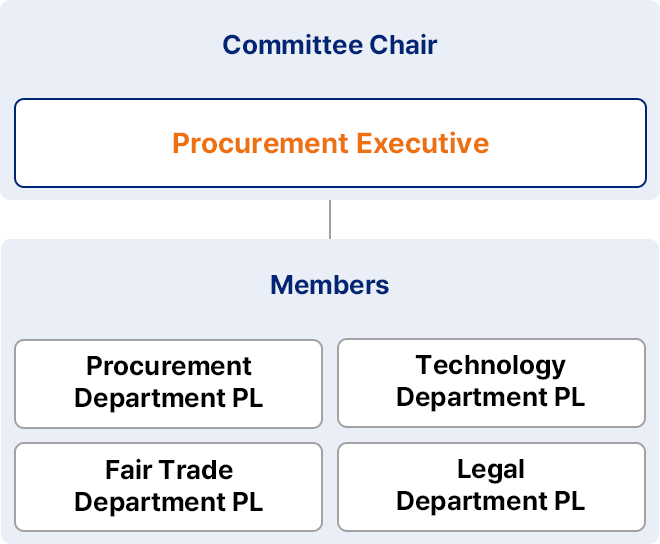
-
- Chairperson
- Purchasing Executive
-
- Members
- Purchasing Department PL
- Technology Department PL
- Fair Trade Department PL
- Legal Department PL
Supply Chain Management Activities
Partner ESG Risk Evaluation and Management
SK Gas conducts SHE evaluations, ethical management assessments, and financial risk monitoring using data from credit rating agencies to select qualified first-tier suppliers. Key suppliers, crucial to our business, undergo comprehensive ESG risk assessments conducted by third-party experts. This includes evaluations of environmental, safety, health, human rights, labor, ethics, and governance risks. High-risk suppliers receive coaching, consulting, and audits to develop and implement improvement plans, which are closely monitored.
Partner ESG Risk Evaluation Indicators
| Category | Main Criteria | Sub Criteria |
|---|---|---|
| Environmental | Environmental Management | Environmental Management Control |
| Eco-friendly Opportunities | Product Environmental Attributes | |
| Climate Change Response | Greenhouse Gas Emissions, Energy Consumption | |
| Pollution Prevention and Waste Management | Waste Management, Hazardous Substances Management, Air Pollutants | |
| Natural Capital | Soil, Noise, Vibration, Odor, Raw Materials, Water Protection | |
| Social | Social Goals | Social Goals Management |
| Human Capital | Information Protection, Human Rights, Health and Safety, Labor | |
| Products/Customers | Conflict Minerals | |
| Partners | Partner Management, Fair Trade | |
| Community | Social Contribution | |
| Governance | Corporate Governance | Information Disclosure, Management Systems, Audits |
| Corporate Behavior | Ethical Management |
Partner ESG Risk Evaluation Process
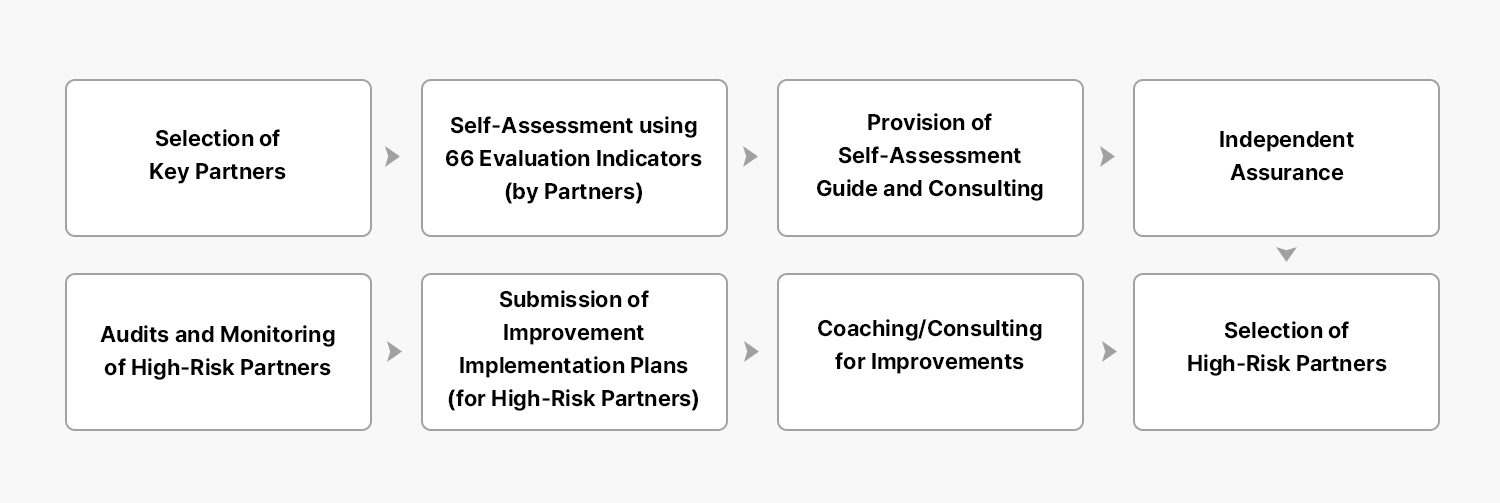
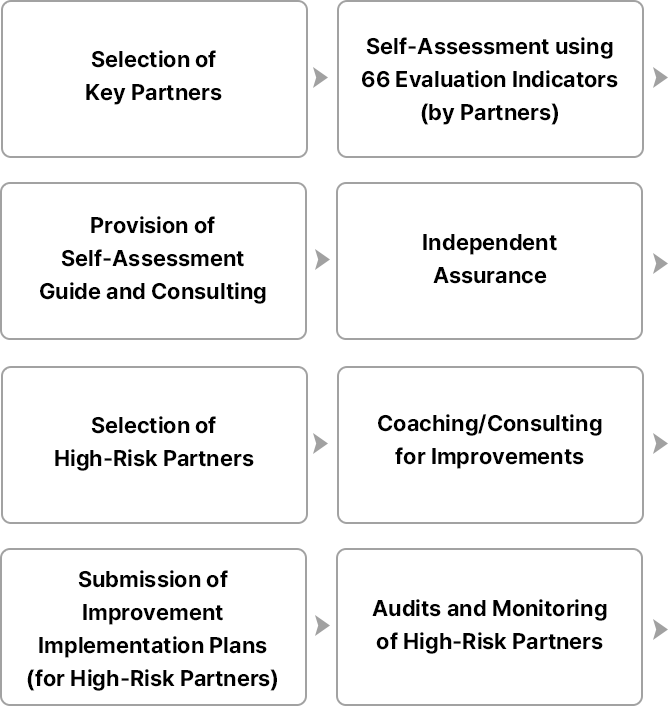
- Selection of Key Partners
- Self-assessment using 66 Evaluation Indicators (Partners)
- Self-assessment Coaching and Consulting
- Third-party Verification
- Selection of High-risk Partners
- Coaching/Consulting for High-risk Partners
- Receipt of Improvement Plans (High-risk Partners)
- On-site Audits and Monitoring of High-risk Partners
SK Gas Partner Code of Conduct
SK Gas is striving to grow together with our partners. All business partners that working with SK Gas must comply with the following requirements and strive for satisfaction of the company and its customers. In addition, when contracting with SK Gas, it is mandatory to comply with the Supplier Code of Conduct.
SK Gas is striving to grow together with our partners. All business partners that working with SK Gas must comply with the following requirements and strive for satisfaction of the company and its customers.
-
Labor
- 1. Anti-Discrimination Partners do not discriminate based on political, economic, or social status, such as race, age, gender, body, religion, etc., that are irrelevant to the job performance, in their employment practices such as recruitment, promotion, compensation, and education.
- 2. Prohibition of Child Labor Partners shall not employ child labor (employees below the minimum age of employment in the relevant country). In addition, young workers (based on local laws) do not engage in hazardous work in terms of safety and health.
- 3. Voluntary Work Partners shall not unreasonably restrict their employees’ mental or physical freedoms or require them to work against their will, and guarantee that the conditions of employment are voluntary.
- 4. Compliance with Working Hours Partners shall not demand work more than the maximum working hours per week stipulated by respective country’s law.
- 5. Humane Treatment Partners strive to create a working environment free from harassment. No inhumane treatment, including sexual harassment, sexual abuse, corporal punishment, mental or physical coercion, of any worker shall be tolerated.
-
Health and Safety
- 6. Occupational Safety and Health Partners prevent all employees from being exposed to risk factors for industrial safety, provide workers with appropriate personal protective equipment, and provide a safe working environment through continuous safety education. In addition, partners strive to establish a safe and healthy working environment to minimize work-related injuries and diseases, retain workers and increase morale.
- 7. Emergency Preparation Partners shall identify possible emergency situations and apply emergency response plans and procedures to minimize damage caused by emergencies.
-
Environmental
- 8. Compliance with Environmental Laws and Pollution Prevention Partners shall comply with environmental laws, reporting requirements, and SK Gas’s environmental/quality management standards. In addition, to prevent environmental pollution, efforts should be made to manage air, rainwater, and waste, identify chemicals and other substances that may pollute the environment when discharged, and ensure safe handling, use, and disposal of these substances.
- 9. Regulation of Substances Contained in Products Partners shall comply with all laws and regulations related to product-containing substances, product labeling (labeling) laws, and customer requirements.
-
Ethics
- 10. Anti-Corruption Partners strive to promote ethical and transparent management. Workers of partner companies perform all duties with integrity and do not take any form of personal benefit from stakeholders by using the authority entrusted to them.
- 11. Fair Competition Partners comply with fair competition laws and conduct all procedures such as pricing, bidding, and transactions in a fair and reasonable manner. Partners do not engage in any unfair actions by abusing dominant market position.
- 12. Responsible Mineral Procurement Partners shall not use raw materials obtained through illegal and unethical methods (minerals mined from mines occupied by armed groups, timber harvested from forest conservation and logging prohibited areas, etc.). Minerals such as tantalum, tin, tungsten, gold, etc. contained in raw materials, parts and products mined by armed groups from Democratic Republic of Congo directly or indirectly provide financial resources or benefits to them, and as they seriously violate human rights in the Democratic Republic of the Congo or neighboring countries, use of their minerals is prohibited.
- 13. Privacy Protection Partners respect individual privacy and do their best to take necessary measures in the collection, storage, processing, transmission and sharing of personal information to protect personal information.
-
Management System
- Partners shall adopt or build a management system that encompasses the contents of this code, and shall comply with relevant laws and customer requirements, and design so that operational risks related to this code can be identified, mitigated, and constantly improved.
Annual Progress
| Year | Participants | Diagnosis Participation | High-risk Identification | High-risk Ratio | Improvement Plan Submission | Implementation Results | Key Details |
|---|---|---|---|---|---|---|---|
| 2021 | Key Partners (LPG Construction) | 6 | 4 | 66.7% | 4 |
|
|
| 2022 | Key Partners (LPG Construction) | 6 | 6 | 100% | 5 |
|
|
| Key Partners (LPG Equipment) | 10 | 10 | 100% | 6 | |||
| Voluntary Applicants | 8 | 8 | 100% | 5 | |||
| Total | 24 | 24 | 100% | 16 | |||
| 2023 | Key Partners | 15 | 4 | 26.7% | 4 |
|
|
| Voluntary Applicants | 3 | 1 | 33.3% | 1 | |||
| Total | 18 | 5 | 27.8% | 5 |
-
[2024 Key Partner Selection Criteria]
- Purchases of KRW 1 billion or more and 10 or more transactions in the last 3 years
- Partner Criteria: Annual sales of KRW 1 billion or more and 10 or more employees
- Exclusions: Group affiliates, overseas Partners
-
[High-risk Partners]
- Minimize ratio through audits/consulting
Partner Support Programs and Goals
Financial Support for Partners
Cooperative Growth Fund
Under the "SK Group Cooperation Agreement for Joint Support of Partner Companies" with IBK Industrial Bank, we provide special interest rate reductions for partner SMEs.

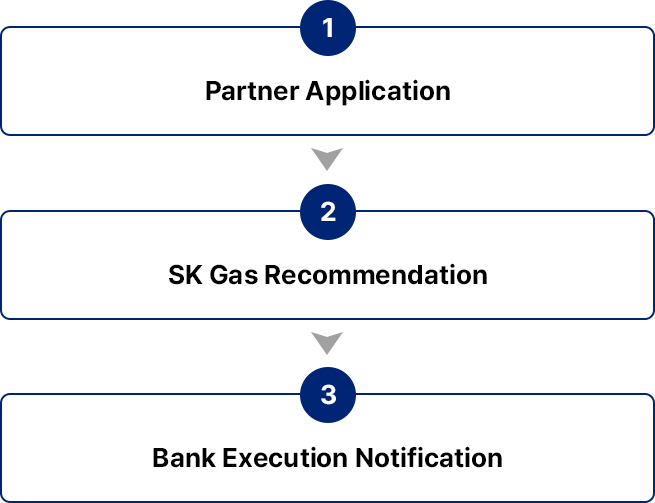
- Partner Application
- SK Gas Recommendation
- Bank Execution Notification
- Partner Payment: SK Gas pays 100% of transactions in cash, aiming to do so within 10 days of issuing the tax invoice.
Performance and Goals of Partner Cooperative Growth Programs
| Program | Overview | 2023 Performance | 2024 Performance | 2025-2026 Goals | 2027 Goals |
|---|---|---|---|---|---|
| CEO Seminar on Shared Growth |
|
7 sessions (5 online / 2 offline) |
4 sessions (offline) |
4 sessions/year (online/offline) |
4 sessions/year (online/offline) |
| Shared Growth Team Leader Leadership School |
|
1 sessions (online/offline) |
1 session/year | 1 session/year | |
| Online Education Platform |
|
7 participants | 27 participants | All partners wishing to receive Education | All partners wishing to receive Education |
| i-ONE JOB |
|
Ongoing | Ongoing | ||
| Partner Meetings |
|
1 session (per site) | 1 session (per site) | 1 session (per site) | 1 session (per site) |
| Partner Safety Education |
|
Ongoing | Ongoing | Ongoing | Ongoing |
| Partner Human Rights Training |
|
1 session | 1 session | 1 session/year | 1 session/year |
| Partner Shared Growth Fund |
|
30% of quota | 50% of quota | ||
| Partner Payment |
|
Average within 6.2 days | 6.8 days | Within 10 days | Within 10 days |
Partner Grievance Handling
Through regular partner roundtables, we listen to partner opinions and seek mutual growth. Various grievance handling channels are operated at each site to address industrial health and safety issues. We also operate the SK Ethical Management Consultation/Report channel to listen to and resolve partner employee human rights grievances.
| Program | Overview | 2023 Performance | 2024-2026 Goals | 2027 Goals |
|---|---|---|---|---|
| Partner Meetings | * Regular roundtables to explore cooperative growth and address partner concerns | 1 session (per site) | 1 session/year (per site) | 1 session/year (per site) |
Partner CEO Seminars
SK Gas considers Partners and sales agencies as "extended family" and aims for mutual growth. To strengthen the management capabilities of our Partners, we hold "Cooperative Growth CEO Seminars" four times a year. These seminars include lectures on global trends, economic outlooks, management, IT, and humanities. From 2024, we will upgrade our existing Cooperative Growth MBA program and launch the Cooperative Growth Team Leader School for middle managers of Partners. Additionally, we provide SK's online learning platform "mySUNI" covering ESG, management, and six other areas for partner development.
Socially Responsible Purchasing Policy
SK Gas manages the amount and percentage of socially responsible purchases (green products, purchases from disabled-owned businesses, social enterprises) to promote sustainable management. We set and achieve ambitious goals to create a socially responsible purchasing environment.
| Category | Unit | 2020 | 2021 | 2022 | 2023 | |
|---|---|---|---|---|---|---|
| Total Purchases | KRW billion | 59.9 | 60.9 | 74.0 | 136.7 | |
| Socially Responsible Purchases | Eco-friendly Products and Services | KRW billion | 0.74 | 0.70 | 1.23 | 0.19 |
| Green Products Purchase Ratio | % | 1.2 | 1.1 | 1.7 | 0.1 | |
| Purchases from Disabled-owned Businesses | KRW billion | 0.12 | 0.09 | 0.10 | 0.22 | |
| Purchases from Disabled-owned Businesses Ratio | % | 0.2 | 0.1 | 0.1 | 0.2 | |

